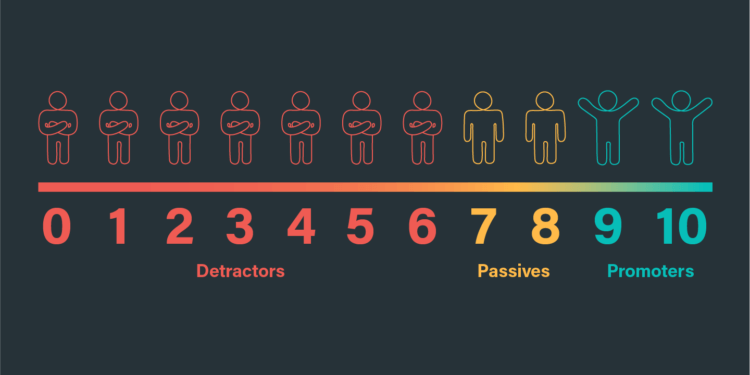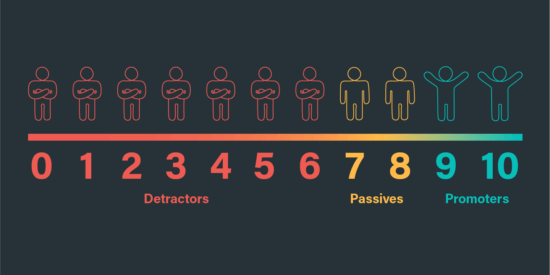For law firms, keeping track of your Net Promoter Score® (NPS®) can help you answer critical questions, such as: What do your clients think of you? Do they think you provide good service? Are they happy with the outcome of their case?
NPS® is a metric used to rate customer loyalty and satisfaction. Measure your NPS®, and you’ll get insights into how to improve your client service, so that you’ll get better reviews, more referrals, and more new clients.
If you don’t know how your clients think about your law firm, and about the service you provide, you have no way of knowing whether they’re recommending you to friends and family—or whether they’re advising their networks to steer clear of your services.
The best way to find out how you’re doing in terms of client service is to ask. But anecdotal feedback only goes so far: You need a system and a metric, such as NPS®, to track to keep tabs on how well your law firm is serving clients, so that you can know, definitively, whether or not you’re setting yourself up for positive reviews and more referrals.
Here’s everything you need to know to start putting NPS® to work for your law firm.
What is NPS®?
A Net Promoter Score, or NPS®, is a metric commonly used to rate customer satisfaction, calculated based on answers to the question “On a scale of 0-10, how likely are you to recommend my service to a friend or colleague?” Based on their answer, NPS® survey respondents are sorted into Promoters (9 or 10), or people who would actively promote your service, Neutrals (7 or 8 ), people who would be neutral, and Detractors (0-6), people who would actively be negative about your service.
How to calculate your law firm’s NPS®
Calculate your law firm’s NPS® by subtracting the percentage of detractors from the percentage of promoters. This will give you an NPS® ranging between -100 to +100.
Companies typically send NPS® surveys to their clients at various stages along the customer journey to get more detailed insights into different aspects of the customer experience. Businesses will also ask for opportunities to improve the client experience, thereby improving their NPS®. Plenty of law firms calculate their NPS® to help keep themselves on-track to deliver an amazing client experience.
Best practices for measuring NPS® at your law firm
To get an accurate read on NPS® at your law firm, and to make sure you’re interpreting results the right way, you’ve got to follow a few key best practices.
Keep the question consistent
It might be tempting to tweak the “how likely are you to recommend …” question asked above after you’ve been sending out NPS® surveys for a little while. Don’t do it. Changing the question might influence client responses, meaning you won’t have an accurate read on NPS®.
Plus, the idea of NPS® is tied fairly closely to the question framed above as-is, with only slight variations. Depending on your firm’s primary practice areas, you may want to stick to “a friend” or “a colleague” instead of “a friend or colleague,” but in most cases it will make sense to keep it broad: Your family law clients may have colleagues who ask for family lawyer recommendations, and your corporate law clients may have friends in the business community who ask for recommendations for a great business lawyer.
Be mindful of timing
The timing of an NPS® survey can influence the result: For example, if you send a survey right after you’ve won a case, clients will be more inclined to give a positive response than if you send a survey right after they’ve received their first bill.
Aim to be consistent with the timing of your NPS® surveys: Some companies, including law firms, survey clients multiple times at key stages of the customer journey to get an average score that’s truly representative of the client experience. The key is to be consistent.
One note: Be mindful of how often you’re reaching out to clients to ask about NPS®, as too many of the same emails will make clients less likely to respond and may even negatively impact their experience.
Ask one follow up question
The NPS® metric is helpful for ensuring you’ve got an objective measure of whether your customer experience is improving, going downhill, or staying the same. However, its the qualitative feedback you get from clients that can help you improve your client service for the future.
Often, NPS® surveys follow up “how likely are you to recommend …” with “why?” so that clients have an opportunity to share what’s working, what’s not, what delighted them, and what frustrated them about your law firm’s service. Not every response will be helpful, but some may help you uncover key blind spots for your firm.
Follow up on NPS® feedback
NPS® feedback is only useful for your law firm if you act on it. If clients keep telling you that your bills are hard to understand, look for ways to make them easier to read. If a client tells you in their NPS® response that they found your welcome email informative and helpful, thank them, and look for ways to make it better.
If your firm’s clients take the time to engage with you and provide feedback, make sure you’re taking the time to respond. This helps build trust, as it shows you’re genuinely looking to hear their thoughts, consider them, and potentially act on them.
You may like these posts
The NPS® of the legal industry
It’s important to see how your firm is serving clients, but it’s also important to see how you compare to the legal industry as a whole. So how does your firm’s NPS® stack up? To find out, you’ll need to first get the NPS® of the legal industry.
The 2018 Legal Trends Report provides an in-depth analysis on the modern legal consumer, including what makes them want to hire a lawyer. As part of this analysis, consumers were given an NPS® survey to get an idea of how the legal industry as a whole is doing.
The results? The legal industry currently has an NPS® of 25, putting it in good company with airlines, wireless carriers, and credit card companies. For context, companies known for excellent customer service and stratospheric business growth, e.g., companies like Amazon, have NPS® in the 60’s or higher.
There’s lots of room for improvement in the legal industry overall: In fact, most firms aren’t even collecting feedback from their clients to help improve their businesses. 42% of firms surveyed only collected feedback casually, and 37% said they didn’t collect feedback at all. This is where it needs to start—collecting feedback and calculating your NPS® will give you a clear picture of where you stand, and help identify opportunities to provide better service, allowing you to get better reviews and grow your business.
What to do if your law firm has a low NPS®?
So, you’ve calculated your law firm’s NPS® for the first time and the results weren’t quite what you expected. You thought your firm provided pretty good customer service, but your detractors came out in force when you distributed your first survey, and they had plenty to share with you.
Negative feedback can sting, but it’s actually one of the most valuable tools available to your firm: If you know what’s going on, you can fix it, but if you never find out, you could be losing positive reviews and referrals without ever knowing it.
There are plenty of ways to handle negative feedback. Take time to think critically about how to move forward, rather than firing off an angry response or making quick decisions about firm policies. Consider whether an issue would be best handled by adopting a new process or a new tool, or if you simply need to communicate with clients more often and set clear expectations to avoid disappointment.
Why measure NPS®?
If you think that referrals are a big source of business for your firm, you’re right. According to the 2017 Legal Trends Report, 62% of consumers ask friends and family for recommendations when they’re looking to hire a lawyer
Knowing whether or not your clients would recommend you—and taking action to improve your firm if most of them wouldn’t—is key to the success of your business and long term business growth.
Tracking your firm’s NPS® is an effective way to keep this idea top-of-mind. It will also keep you honest about how you’re progressing: It’s easy to convince yourself that you’re running an efficient, client-centered law firm, but your NPS® score won’t lie.
Conclusion
For modern, competitive law firms, tracking NPS® is the way forward. A client-centered approach is key to any law firm’s success in the digital age (consider; clients have come to expect the instant service and satisfaction they get from Amazon, Netflix, and Uber in every consumer interaction, including ones they have with their law firms), and the only way to stay ahead of the curve is to keep track of whether or not your clients were satisfied enough that they’d recommend your services to others.
When tracking NPS®:
- Keep it consistent. Same question. Same time. Every time. Tweaking things will influence your results.
- Don’t sweat the detractors. If you’re getting lots of negative feedback, that just means you have lots of opportunity to better your business. The worst negative feedback is the feedback you never hear about, and never get a chance to act on.
- Act on feedback. Tracking NPS® only helps improve your firm if you use the feedback you get to change your processes, policies, tools, and communication techniques. Bonus: Responding to clients and ensuring they feel heard is another client-centered best practice!
The best step to take is simply to start: Try your hand at measuring NPS®, and if it doesn’t work out, keep making small changes until you’ve got a useful feedback loop to help your firm be both client-centered and competitive.
Net Promoter®, NPS®, NPS Prism®, and the NPS-related emoticons are registered trademarks of Bain & Company, Inc., Satmetrix Systems, Inc., and Fred Reichheld. Net Promoter Score℠ and Net Promoter System℠ are service marks of Bain & Company, Inc., Satmetrix Systems, Inc., and Fred Reichheld.
We published this blog post in November 2018. Last updated: .
Posted in: Marketing








